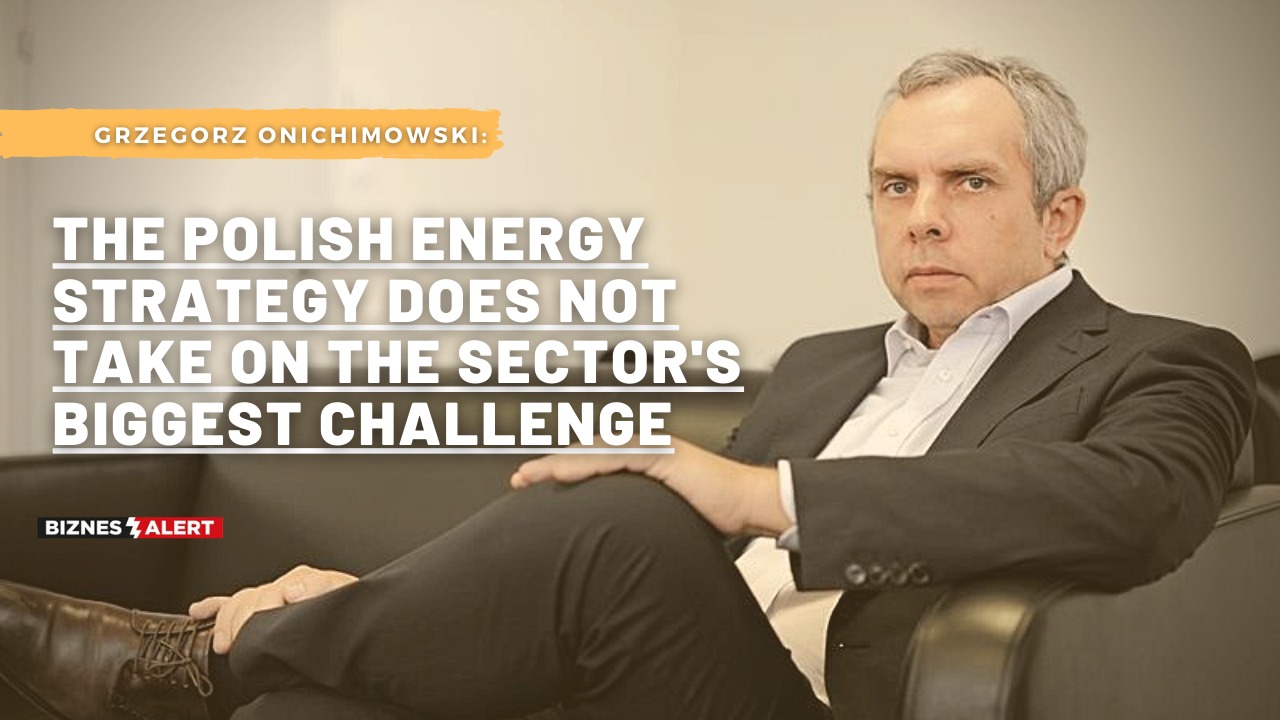The energy strategy completely fails to address the reality of the situation. It’s pooling wool over our eyes and ignores the key change in the energy paradigm – increasing civic participation in power generation. We claim we will solve the issue of high energy prices in Poland thanks to investing in nuclear power and offshore farms, but this will only postpone the fundamental problems of the energy sector by a couple of years – Grzegorz Onichimowski, senior consultant at NODES AS and former president of the TGE, says in an interview with BiznesAlert.pl.
BiznesAlert.pl: Shortly after the adoption of the Polish Energy Policy until 2040 (PEP2040) and the Act on offshore, a debate on the maximum price in the support mechanism for offshore wind farms started. This means the investors are hoping for bigger assistance. Does this mean Poland’s energy strategy, which includes large investments in offshore and nuclear power, is designed correctly?
Grzegorz Onichimowski: The maximum price is neither too high nor too low. The problem is that we abandoned the competitive auction mechanism, which works in case of onshore wind farms. It is said that this decision was made to launch at least the first few projects as quickly as possible. However, the result is that we are discussing which price is ok and which isn’t. I am all for competitive mechanisms in all areas of the energy sector. The entire energy strategy needs to face this problem. To me it seems that its authors are using a language that is a lot more contemporary than the one used by Krzysztof Tchórzewski’s energy ministry, but to a large degree they are saying the same. The energy sector is dominated by large companies, mostly state-owned, which will replace coal-fired power plants with offshore or nuclear energy, but from the market point of view nothing will change. This is a fundamental mistake.
What should change?
Most of all, we need to introduce competition at the lowest level and decide how to set up prosumer energy generation, onshore wind and PV power production to make them part of a competitive market. Even the entities that participate in auctions with a minimum price receive an offer that is lower than large units on the exchange. We need to develop virtual and collective prosumers, which will allow every Pole to take part in the energy transition. The prosumer will own the proverbial share in a wind or PV farm, which will protect them against changes in energy prices, as they will own a specific capacity. PPA contracts and partnerships with industry are to work on the basis of similar rules. We have already tried to implement an entire policy only with the usage of state-owned companies. I could be mean and give examples of how every single previous government tried this in the past and failed. It is enough to check the stock valuation of state-owned companies from the energy sector on the exchange years after the civic privatization. The stocks are worth nothing in comparison to their original price.
Perhaps this is the state’s attempt at ensuring the security of supply?
The state’s main job is to make room for competition by providing distribution and transmission networks. Distribution companies should be carved out from horizontally consolidated groups. Previously the transmission system operator was carved out, because 80-90 percent of capacity had been connected to it, so it was necessary to create neutral space for competition. We can expect that in the coming years we will go the other way and 80-90 percent of capacity will be connected to the distribution network. The network needs to be taken care of, so that distribution companies have a good financial standing, but that they do not become part of large companies. It should be in their interest to connect as many prosumers and small energy producers as possible, as they should be able to participate in flexibility market, or peer to peer, where transmission losses are minimal, neighbors share energy, and where one can build small power generators near manufacturing facilities and sell power generated by them. Today whether a wind farm is 5 or 500 km away from a given factory the transmission fee stays the same. We need to reinstate independent power producers to the competitive market. Otherwise there will be no competition, because the electricity cost on the bill will be the smallest problem, and the majority of the cost will be constituted by transmission fees.
So does the energy strategy respond to our real needs?
No, it completely fails to address the reality of the situation. It’s pooling wool over our eyes and ignores the key change in the energy paradigm – increasing civic participation in power generation. We are saying we will solve the issue of high energy prices in Poland thanks to investing in nuclear power and offshore farms, but it will only postpone the fundamental problems of the energy sector by a couple of years. Stories about how Poland’s nuclear capabilities will be bigger than France’s only increase the risk of failing and do not respond to the clear and present problem that needs to be solved immediately. We need to connect civic generation with local governments, free the potential of distribution systems to connect to them as many dispersed power sources as possible.
There is talk of supporting renewable energy sources and liberalizing the regulations.
Maybe it will happen, maybe it won’t. Two years ago I came back from working abroad and I heard that some regulations that limited the growth of renewable energy would be quickly amended. But the years go by and nothing is happening. We are listening to bombastic promises that are never delivered. The best example is the history of Polish nuclear projects that is older than dirt.
Interview by Wojciech Jakóbik









